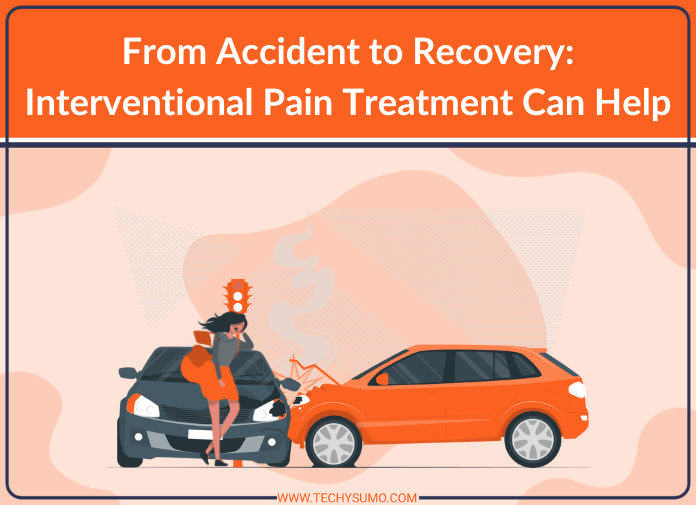Car accidents are a life-altering experience, often leaving victims grappling with more than just vehicle repairs. The physical and emotional toll can be immense, creating challenges that extend far beyond the initial impact.
This blog post explores how interventional pain treatment can be a game-changer in not only alleviating physical pain but also improving overall well-being and aiding in the recovery process.
Table of Contents
Understand Interventional Pain Treatment

Interventional pain treatment is a specialized field focusing on diagnosing and treating pain through minimally invasive techniques. These treatments are designed to target specific sources of pain, offering relief that is both effective and long-lasting. Unlike traditional pain management methods, which may rely heavily on medication, interventional pain treatment aims to address the root cause of discomfort.
Know the Immediate Benefits of Interventional Pain Treatment
One of the most immediate advantages of interventional pain treatment is the rapid relief it can provide. For car accident victims, this can mean a significant reduction in pain and discomfort, allowing them to focus on their recovery without being constantly distracted by persistent aches. Additionally, these treatments often have fewer side effects compared to oral medications, making them a safer option for long-term pain management.
Improve Mobility and Functionality
Pain can severely limit a person’s ability to move and perform everyday tasks. By targeting and reducing pain, interventional treatments can help improve mobility and functionality. This can be particularly beneficial for car accident victims who may be dealing with injuries that have left them immobilized or struggling with basic activities. Improved mobility can lead to a more active lifestyle, which is essential for overall health and well-being.
Also Read
Enhance Mental and Emotional Well-being
Pain doesn’t just affect the body—it has a profound impact on mental and emotional health as well. Chronic pain can lead to feelings of frustration, anxiety, and depression. Interventional pain treatment can alleviate these emotional burdens by providing consistent pain relief. When physical pain is under control, individuals are better equipped to manage stress and enjoy a higher quality of life.
Facilitate a Quicker Return to Daily Activities
The sooner a person can return to their normal routine, the better their overall recovery will be. Interventional pain treatments can expedite this process by reducing pain levels and improving functionality. Whether it’s returning to work, engaging in social activities, or simply performing daily tasks, regaining these aspects of life is crucial for emotional and psychological well-being.
Support Long-term Recovery
Long-term recovery from a car accident involves more than just immediate pain relief. It requires ongoing support and treatment to ensure that the healing process continues smoothly. Interventional pain treatments can play a critical role in this by providing sustained relief and preventing the recurrence of pain. This ongoing management is essential for maintaining progress and achieving a full recovery.
Have a Personalized Treatment Plans
Every patient’s experience with pain is unique, and so are their treatment needs. Interventional pain specialists can develop personalized treatment plans that are tailored to the specific type of pain and injury. This individualized approach ensures that patients receive the most effective treatment possible, maximizing their chances of a successful recovery.
Minimize Dependency on Pain Medications
One of the significant concerns with traditional pain management is the risk of dependency on pain medications. Interventional pain treatments offer an alternative that can reduce or even eliminate the need for long-term medication use. By addressing the root cause of pain, these treatments provide relief without the associated risks of opioids and other painkillers.
Encourage Active Participation in Recovery
Active participation in the recovery process is vital for achieving the best outcomes. Interventional pain treatments can empower patients to take control of their healing by providing the pain relief needed to engage in physical therapy, exercise, and other rehabilitative activities. This active involvement is crucial for rebuilding strength and functionality.
Build a Supportive Healthcare Team
Recovery from a car accident is often a team effort, involving various healthcare professionals. Interventional pain specialists work closely with other medical providers to ensure a comprehensive approach to treatment. This collaborative effort helps to address all aspects of a patient’s recovery, from physical rehabilitation to mental health support.
Also Read:
Essential Items To Include in Your Car Camping Emergency Kit
Going On A Road Trip? Car Insurance Types You Should Know
When Is The Right Time to Refinance an Auto Loan?
Volvo’s Honorable Role in Automotive Safety
Take the First Step Towards Recovery

If you’ve been involved in a car accident and are struggling with pain, explore all available treatment options. Interventional pain treatment offers a promising solution for those seeking relief from chronic pain and a path towards recovery. Consulting with an interventional pain specialist can provide valuable insights into which treatments may be most effective for your specific condition.
Interventional pain treatment is more than just a means of alleviating pain—it’s a comprehensive approach to recovery that addresses the physical, mental, and emotional aspects of healing. For car accident victims, these treatments can make a significant difference in their quality of life, enabling them to move forward with confidence and resilience. If you’re ready to take the next step in your recovery, consider reaching out to an interventional pain specialist like NexGen Medical Centers to learn more about how these treatments can benefit you.
Author Bio

Karleia is a freelance blogger. You can follow Karleia on X @KarleiaSteiner.






